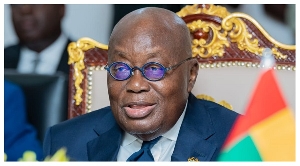Opinions of Thursday, 27 August 2009
Columnist: Oteng, Maxwell
The Cycle Of Vindictive Politics
: Will It Break Our Nascent Democracy?
By Maxwell Oteng
In a continent noted for political and ethnic conflicts, especially in the eyes of the West, it isn’t surprising that any semblance of a democratic experiment would be milked over and over again as a success story by outsiders who are constantly looking for opportunities to preach their “democracy gospel”. This is the context within which one must view the wave of praise and adoration that Ghana has received for its burgeoning democratic experiment.
However, beneath the exterior of a smooth orderly and peaceful democratic regime, there appears to be fault-lines and undercurrents of ethnic tensions, political vindictiveness, and socio-economic class imbalances. While Ghana has been able to suppress the righteous indignations and concerns of class inequalities (partly because of the nonexistence of a real political movement to mobilize the underprivileged class) and temporarily freeze the boiling pot of ethnic tensions to a very large extent, it is not so clear that the country would be able to avoid the potential landmines that the politics of vindictiveness may lay on its way. This is because as Reinhold Niebuhr wisely observed “democracies are indeed slow to make war, but once embarked upon a martial venture are equally slow to make peace and reluctant to make a tolerable, rather than a vindictive, peace.” Additionally, examples of ethnic conflicts have shown unequivocally that the consequences of the inevitable violence that almost always emanates from them can be deadly and horrific. Think Rwanda. I am not saying that our simmering ethnic tensions will eventually snowball into a Rwanda-type genocidal episode. But then who has a crystal ball?
Revenge is based on the fallacious logic that “two wrongs make a right”. In politics, revenge more often than not, becomes the vehicle for damaging an opponent (sometimes) out of personal piques, and for clipping the wings of an opposition party. However like all human emotions, vindictiveness has its own karma. In effect not only does revenge beget revenge, but equally important, revenge can wreak a great deal of emotional toll on parties at both ends of it. For instance, in the futuristic movie Star Trek II: The Wrath of Khan, Khan's hatred of Kirk is so palpable and his desire to exact revenge so intense that Khan would lose everything, even his own life in his efforts for revenge. Also, in the Akira Kurosawa classic, The Bad Sleep Well, the main character Nishi, with Helmetesque predisposition, tries to avenge his father’s murder, but ends up getting murdered himself. Well, you may say that these are tales brewed in the pots of fantasyland, but in the real world, we see parallel stories in our communities all the time.
In politics, the most important oil that greases the wheel of peaceful governance is the public trust, the unspoken sacred bond between a people and their presumptive representative. Wherever the politics of vindictiveness is practiced, it damages the public trust, and this in turn can lead to unnecessarily heightened levels of social tensions. In the two political cycles when governments changed hands – from incumbent party to the main opposition party – besides the jangle of politics that has been drowning voices of sanity in our political discourse, vindictive politics has become all too common. I am not advocating that we gloss over acts of fraud and un-scrupulosity against the State by past administrations and their henchmen. By the letter of the law, let us prosecute all merchants of fraud and un-scrupulosity as well as all law-breakers. But the arc of justice cannot be selectively unidirectional. When justice becomes selective, even situations of legitimate prosecutions would be deemed (rightly or wrongly) as pursuits of persecution of political opponents in the eyes of some. I am afraid, that is exactly what our political climate in the last nine years is turning out to be. When the NPP was in power, its arch of justice seemed so bent on prosecuting some members of the Rawlings Administration – Kwame Peprah, Tsatsu Tsikata, Dan Akpodapi to mention but few - to the extent that even though these people might have abused their power and broken national laws, their prosecutions were perceived as persecution of political opponents. The same thing seems to be happening now with the ruling NDC directing its arc of justice exclusively at some members of the previous NPP regime. In both instances the impression each regime sought to portray was that “we are the angels of sacrosanctity, incorrigibility, and scrupulosity and our political opponents are the nation wreckers. But any Ghanaian with average intelligence knows that corruption is so ingrained in our political culture that it would be impossible for any administration to convince Ghanaians that they’re corruption-free during their time in power. So the question is why do ruling parties refuse to prosecute corrupt members of their administrations, but are hell bent on bring the full weight of the law on those with similar character but happen to wear different political stripes than their own?
Democracies thrive and sustain on the quality of their institutions, particularly those charged with promoting justice, equality and accountability for all citizens. These institutions, by their very presence and the quality of their work can strengthen the public trust in their government. So when these institutions give even the slightest appearance that they are being used for the pursuit of vindictive politics, the very fabric of our democracy becomes shaken. Unfortunately that is the perception that some Ghanaians have for the Bureau of National Investigation (BNI) following their aggressive pursuit of “justice” against former NPP officials. Did the BNI suddenly wake up and realize that these people abused their positions? Why couldn’t the BNI go after these people when they were in power? If we want to restore the public trust in public institutions such as the BNI, we must stop the politicization of these supposed-to-be-apolitical institutions.
My personal instinct (I may be wrong) about President Mills is that rather than being consumed by the hysterics in his party for vindictive exercise of benighted politics, he would prefer to focus on getting the country on a firm economic footing, encourage job creation and foster confidence in the economic future of the country. And in many respects that is what the country desperately needs him to do. I concede that one could intellectually argue that part of fostering confidence in the future of the country is purging the country of abuses by those in prior administrations. If that is the case, why should such an exercise be stopped with punishing the practices of the Kuffour Administration or in the case of the NPP regime, the practices of the Rawlings Administration? . If democracy has made us a little wiser and suddenly we are mustering the political will and discovering our moral sensibilities, why not cast the “justice net” wider and prosecute a whole panoply of previous Administrations for the abuses and corruption they reined on the country during their times in power? May be we should start from the Rawlings Administration to Mills Administration, covering the lifespan of our nascent democratic experiment? Maybe Ghana needs a “house-cleaning exercise” or a Truth and Accountability Commission to clean its past abuses and corrupt practices. But this exercise or Commission, if ever decided upon, must begin with the performances and practices of members of the present administration so that it doesn’t give the appearance that it is designed as a witch-hunt to persecute political opponents or some members of particular ethnic groups. By all means let’s take our state institutions out of politics of vindictiveness. These institutions are not there to do the bidding of any one particular political party. More important, politics of vindictiveness can be detrimental to our burgeoning democracy because it forces political roles on apolitical institutions. It therefore erodes the public’s confidence in such institutions and its trust in their government. We need our president to exercise some presidential wisdom to help uproot vindictive politics from our national polity.












